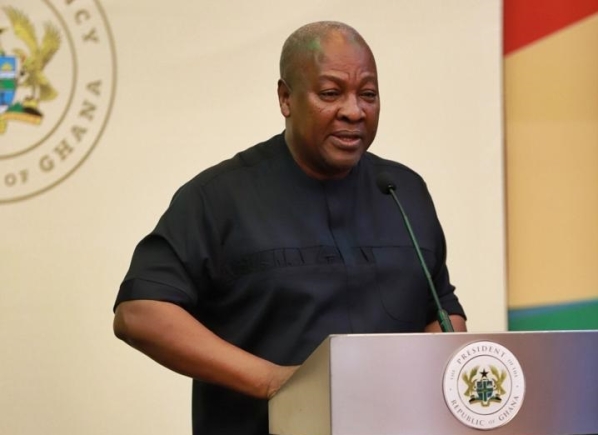President John Dramani Mahama has revealed a shocking abuse of Ghana's foreign exchange system, where over $42 billion exited the country in the past four years through payments for imports that never arrived.
Speaking at a media encounter at the Jubilee House last Wednesday, President Mahama disclosed that investigations uncovered a pattern of companies securing foreign exchange from commercial banks to pay for goods, but failed to deliver them into the country.
The massive outflow of foreign exchange has severe implications for the country's economy, including reduced foreign exchange reserves, cedi depreciation, and an impact on businesses and individuals.
The shortage of major foreign currencies, particularly dollars, can lead to a depreciation of the cedi, with significant implications for inflation, interest rates and economic growth.
Irregularities
The government has currently taken steps to address irregularities in the activities of money transfer companies, which have collected dollars abroad but failed to repatriate them into the country.
The President added that some banks had already been sanctioned and that individuals would soon be interrogated, with the prospect of further penalties if wrongdoing was confirmed.
Sanctions
The Bank of Ghana (BoG) last week suspended the remittance partnerships of eight firms, five of them money transfer operators and three of them payment service providers, citing breaches of its updated guidelines for inward remittance services.
The affected companies are Flutterwave, Cellulant Ghana, Tap Tap Send, Afriex, Halges Financial Technologies, Top Connect, Remit Choice, and Send App.
The suspensions, effective September 18, 2025, will last for one month, except for Halges, which faces an indefinite suspension until it secures fresh approval.
The BoG said Flutterwave and Cellulant Ghana specifically violated paragraphs five and seven of the guidelines, which set out licensing requirements for electronic money issuers and operational modalities for remittance services.
A commercial bank, which acted as a settlement bank for the suspended firms, also had its foreign exchange trading licence suspended for one month.
The move is part of tighter oversight aimed at curbing misuse of unapproved remittance channels, unauthorised foreign exchange swaps and irregular exchange rates.
Cedi to adjust
President Mahama also confirmed that the central bank had halted its interventions in the foreign exchange market, allowing the cedi to adjust on its own after a period of sharp depreciation.
He explained that the central bank’s interventions were necessary at the height of currency volatility, when steep losses undermined economic planning.
President Mahama reiterated an earlier forecast he made that the currency would settle at a sustainable level, stating that the target was to cap any further weakening at about five per cent annually.
“The cedi is making an adjustment, and I believe that it will settle at a certain rate and we’ll make sure that any depreciation that occurs in the value of the cedi is within a margin of about five per cent per annum,” he said.
"A strong cedi is good for all of us," he said, underscoring the need to safeguard Ghana's currency as the government worked to stabilise the economy.
“I believe that it is about stopping rapid depreciation of the currency.
When you have steep depreciation like we had in 2024, 25 per cent depreciation in the currency in the first half of the year, it makes planning difficult.
“And so Bank of Ghana has been intervening in the forex market, but they’ve withdrawn,” President Mahama said.
His remarks come amid public scrutiny over the performance of the cedi and speculation about the extent of BoG’s support operations.
Government, the President said, remained committed to ensuring that any further depreciation was contained within sustainable limits to restore confidence in the financial system and support long-term economic planning.
No capital market now
The President also ruled out an early return to the international capital market in spite of signs of economic stability under his administration.
President Mahama emphasised that the government remained focused on fiscal discipline and expenditure prioritisation rather than rushing back to external borrowing.
"We have survived without going to the capital market.
We have survived without borrowing.
Who would have thought some years ago that Ghana's economy could be run without external debt financing, and yet we have survived," the President stated.
He attributed the gains to recent reforms that had enabled the government to restructure public spending, directing resources into priority sectors while cutting down on needless expenditure.
These measures, the President said, had delivered tangible results, particularly in stabilising the economy and sustaining growth.
The administration's focus on fiscal discipline had paid off, President Mahama stressed, adding that the government would consolidate the recovery before considering re-entry into the capital market.
"We shouldn't be in a hurry to go back to the capital market. It is all about fiscal discipline.
As President, I will not favour a quick return to the capital market. We must consolidate our economy first before seeking external financing," he emphasised.
Ghana's absence from international markets since its 2022 sovereign debt default has forced the country to rely on domestic revenue mobilisation, multilateral support, and fiscal adjustments to finance government operations.
President Mahama's stance reflects a cautious approach to economic management, prioritising stability and sustainability over quick fixes.

